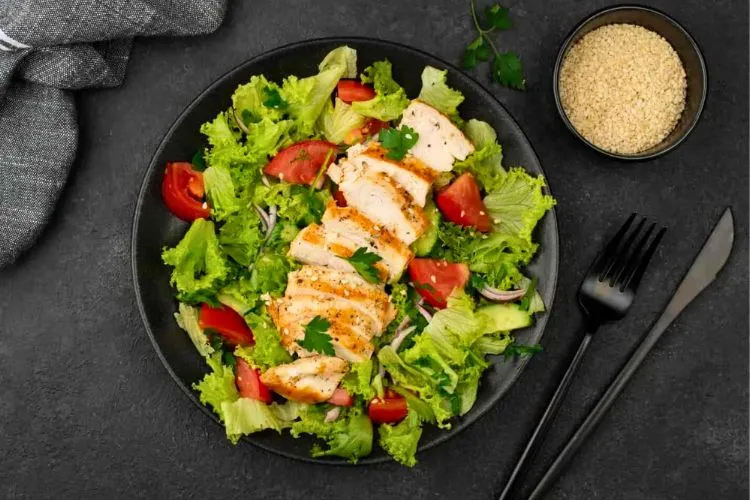Caesar salad, a popular dish loved by many for its crisp lettuce, creamy dressing, and savory accents, often finds its way onto our dining tables. But, can dogs eat caesar salad?
Given the complex mixture of ingredients in Caesar salad, it’s crucial to dissect its components to understand potential impacts on a dog’s health.
This article delves into the nutritional benefits and risks associated with feeding Caesar salad to dogs, aiming to guide pet owners in making informed decisions about their furry friends’ diets.
🐾 Can dogs eat caesar salad?
Dogs should not eat Caesar salad. Though plain lettuce itself is not harmful, Caesar salad usually contains ingredients that can be toxic to dogs. Garlic and onions, often found in Caesar dressing, are harmful and can cause anemia in dogs.

Furthermore, croutons might be seasoned with garlic or other spices that are unsafe for dogs. Cheese present in the salad may not be suitable for lactose-intolerant dogs, and the salad’s dressing typically has a high fat and salt content, which is unhealthy for them.
Additionally, Caesar salads occasionally contain anchovies, which are not toxic, but the dressing could have additives and preservatives not recommended for a dog’s diet. It’s best to keep Caesar salad and similar human foods away from dogs to prevent any health issues.
🐾 Main Ingredients Analysis
Lettuce: Lettuce, primarily composed of water, is generally safe for dogs in moderation. It can be a low-calorie snack that provides hydration and minor nutritional benefits. However, it’s essential to wash it thoroughly to remove any pesticides or chemicals.
Dressing: Caesar dressing typically contains garlic, anchovies, parmesan cheese, egg yolks, and olive oil. Garlic is toxic to dogs, even in small amounts, leading to gastrointestinal upset and, in severe cases, anemia.
Anchovies, while not toxic, are high in salt, which can be harmful in excess. Parmesan cheese and eggs could cause digestive issues, particularly in dogs with lactose intolerance or allergies to dairy or eggs. The high fat content in the dressing can also lead to pancreatitis.
Croutons: These bread cubes often contain garlic and onion powder, both of which are toxic to dogs. Additionally, the wheat in croutons can be problematic for dogs with gluten sensitivities.
Cheese: While some dogs can tolerate small amounts of cheese, many are lactose intolerant. Cheese can lead to gastrointestinal upset, including diarrhea and vomiting.
Anchovies: These small fish are rich in omega-3 fatty acids, which can be beneficial for a dog’s coat and skin health. However, the high sodium content in preserved anchovies can lead to dehydration, sodium ion poisoning, and other health issues if consumed in large quantities.
🐾 Safe Alternatives and Creating a Dog-Friendly Caesar Salad
To include your furry friend in enjoying a Caesar salad-like treat, consider these dog-safe alternatives and modifications:

Lettuce Base: Stick with plain, washed lettuce. Romaine is fine, but in small amounts due to its higher fiber content. Ensure it’s thoroughly cleaned to remove any pesticides or chemicals.
Dressing Substitute: Create a dog-friendly dressing by blending plain, unsweetened yogurt with a bit of olive oil and lemon juice. This mixture provides a creamy texture without harmful ingredients. Avoid garlic, onions, and high-fat dairy products.
Crouton Replacement: For a crunchy element, consider adding a few plain, cooked, unsalted pieces of sweet potato or apple. Ensure these are cut into small, manageable pieces to prevent choking.
Cheese Moderation: If your dog can tolerate dairy, sprinkle a very small amount of low-lactose cheese, like mozzarella or a specially formulated dog-safe cheese. Always introduce any new food in moderation to monitor for any adverse reactions.
Protein Addition: Instead of anchovies, consider adding cooked, unseasoned chicken or turkey breast. This provides a healthy protein source without the risks associated with high sodium content.
Overall Tips
- Always introduce new foods to your dog’s diet gradually to monitor for any allergic reactions or gastrointestinal upset.
- Keep portions small to prevent obesity and maintain a balanced diet.
- Consult with your veterinarian before introducing new ingredients, especially if your dog has specific health concerns or dietary restrictions.
By making these adjustments, you can prepare a version of Caesar salad that’s safe for dogs, allowing them to partake in the mealtime experience without risking their health.
While addressing caesar salad, it’s interesting to note other food items dogs might enjoy. For instance, considering alternatives like the flavorful ‘cilantro lime rice for dogs‘, or investigating the nutritional benefits of ‘chicken hearts for dogs‘, can expand your pup’s diet and keep it healthy.”
Conclusion:
Caesar salad is not a safe choice for your canine friend. Its typical ingredients, including garlic, onions, and rich dressings, pose real health risks for dogs. Anchovies and cheese may be less dangerous but can still lead to digestive issues.
Instead of sharing your salad, opt for dog-safe vegetables as treats. Always prioritize your pet’s health and consult with your vet about appropriate snack options.
Remember, when it comes to your dog’s diet, it’s better to err on the side of caution and stick to foods that are known to be safe for them.
